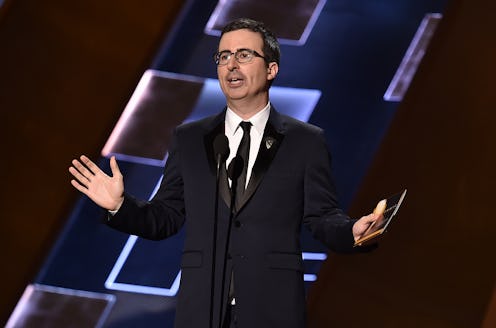John Oliver has never been afraid to speak his mind about everything that's wrong with the United States. Whether it's the latest only-in-America fast food trend or the country's overworked public defenders, Oliver always offers razor-sharp insight (and criticisms) about America. Oliver isn't afraid to mock celebrities, politicians from both sides of the aisle, and everyone in between, making him the perfect candidate to host a show that takes aim at all things wrong in America. And based on what he's said in the past about education on his HBO show Last Week Tonight, it's clear that Oliver's stance on education is one of deep disapproval.
Oliver is no stranger to mocking American ways of life. Before he had his own TV show, Oliver served as The Daily Show's "Senior British Correspondent." (Then, when Jon Stewart went on vacation in 2013, Oliver filled in as host, which eventually led to him getting his own series.) Oliver's comedy style has flowed perfectly from his shorter Daily Show segments to hosting longer discussions on Last Week Tonight each week. Oliver is unafraid to tackle issues most pundits aren't discussing, at least not candidly, and since the show's on HBO, he's also free to use whatever language necessary to get his points about America's terribleness across. Here are some of Oliver's best insights into America's warped ways of teaching children.
1. On An American Public School Education
In one memorable — and recent — example, Oliver used Labor Day weekend as an opportunity to remind American children of all they'll learn (or not learn) in school this year. In a web exclusive video clip from Last Week Tonight, Oliver says that in world history class, for example, children will learn "that Africa and Asia are places, but that's about it." American history classes, meanwhile, will be void of the one thing Oliver wants children to learn about: the love affairs of Warren G. Harding. Later in the clip, he also dings English literature classes, adding that in writing essays, "you can't be wrong." To finish off the clip, Oliver offers a "Who Dies at the End?" guide for high schoolers who don't finish their assigned English readings.
2. On Student Loan Debt
It's not only the lessons themselves that Oliver takes issue with. In a Last Week Tonight episode last September, Oliver railed against America's crushing student loan debt, comparing it to HPV. "If you go to college, you're almost certainly going to get it," Oliver says. "And if you do, it will follow you for the rest of your life."
3. On Standardized Tests
In a Last Week Tonight episode this past May, meanwhile, Oliver criticized the U.S. standardized testing system, saying that standardized tests are the "fastest way to terrorize any child." Oliver criticized the testing system for boosting testing companies while confusing children for "talking pineapples." When experts can predict how often children are likely to throw up in relation to the exam, that might be the sign of a broken system, Oliver suggests.
4. On Sex Education
Even sex education in America is woefully subpar by Oliver's standards. In an August clip, Oliver criticizes the fact that individual states have the right to make up their own rules about what constitutes sex education. Without any requirements, many children are taught abstinence-only sex education, which often leads to a fear of sex and a lot of slut-shaming.
5. On For-Profit Colleges
Before Corinthian Colleges filed for bankruptcy in May, Oliver had some very harsh words to share about for-profit colleges. In the same episode in which he discussed student debt, Oliver criticized the high monetary costs of attending for-profit schools, as well as their exclusive recruiting techniques.
Last Week Tonight is on hiatus this week, but we can't wait for more of Oliver's critiques of America when the HBO show returns. Of course, Oliver's said plenty of insightful things about more American institutions than our education system, but as students head back to school and to college and start studying these next few weeks, Oliver's spot-on education critiques seem especially relevant.
